Exercise in Intelligent
•/AST night—at a period in the evening, I may perhaps point • out, when my opposite numbers in the professions, the civil service, industry, commerce, and what-have-you, might reasonably be expected to be taking their well-earned leisure after a hard day's work—I sat down, armed with a very large sheet of paper and a rule, to tackle one of the multifarious 'desk' tasks which are apt to keep the farmer from his feather- bed. The job was to plan my grass production for six years ahead—six years because I work that part of the farm reason- ably accessible to the dairy on a six-course 'rotation of three years' grass and three years' cropping, and the remainder on a four-course rotation of three years' crops and one year's hay. It is not altogether a simple task even when considered as a mere problem in mechanics—setting out, year by year, which fields will be in grass, which will be laid down to grass, and which will be ploughed out again to crop—because considerations of selection of crop, and suitability of individual fields, have to be given due weight. But it is much more than a mere exercise in mechanics : it is an exercise in intelligent anticipation, because the whole thing must be based upon the amount of grass I will require. And there's the rub.
I had to say to myself, `As far as I can see, I am going to need this amount of grazing, this amount of silage, and this amount of hay every year. To get it—making due allowance for the differences in yield, one year with another, due to weather conditions—I must have so many acres of first, second, and third year's grass, and so many acres of permanent grazing every year."1' hen, having decided upon the required acreage; I must, somehow, fit it into the rotation.
But note, the whole exercise must necessarily be based upon the estimated amount of grass, in its various forms, required by a certain number of cattle. I can make that estimate fairly easily on the basis of past experience if I know the number of cattle involved—but how am' I to arrive at that all-important figure? Were I able to say, definitely, that the number of cattle I am budgeting for in 1956-57 will remain more or less constant until 1961-62—or even that it would increase or decrease by a definite proportion at any point in the six-year programme—, there would be no trouble. But if, during the six years, the number of cattle has, all unforeseen, to vary significantly, the whole programme obviously goes haywire—and it is not a programme which can be easily or suddenly adjusted without severe, and possibly even disastrous, dislocation to the all- important rotation and to the whole consensus of farming operations.
Basically the whole business depends on milk. I grow the grass primarily to produce a certain quantity of milk—or, perhaps more accurately, to maintain a certain number of milk cows—with a subsidiary ,production of young stock and beef. So long as I can determine the amount of milk that it v, likely to be profitable for me to produce for six years ahead I can plan with reasonable accuracy and assurance. But that IN precisely what I cannot do. The whole background against which I had to perform last night's exercise was,one of doubt, extremely unhappy doubt, for I do not know—and nobody can know—what the milk price position is going to be in two years', let alone in six years', time.
Two years ago I might have planned on the assumption that would be good policy for me to increase my milk production —and; therefore, my number of cattle and my acreage of grass —up to the limit set only by the acres I cduld make available from other farming operations for this purpose. For years, during the war and since, the Government had been crying for more, more, and yet more milk; and, by guaranteeing the farmer good prices for milk and by subsidising its consumption, they had been getting it. Suddenly, just over a year ago, the Government began to doubt if it really wanted all the milk that was presently being produced. It decreed that the expansion in milk production must be stopped, and it used the machinery of the annual price review to enforce its decree. In effect the farmer has been warned not merely to curb his enthusiasm for pro- ducing more milk, but actually to consider very seriously whether it would not be better for him to produce less. We have not just reached the peak of the ascent: we are poised, some- what uncomfortably, on the verge of the descent: and there arc many who fear that it may prove a steep, a slippery, and pos- sibly a catastrophic slope.
What has been happening for some months now is that production has continued to rise, although at a decreasing rate —not because the farmer i so plain dumb stupid that he goes blindly on turning out more milk regardless of the fact that his margin of profit on it is dropping rapidly to the danger point. but because it is extraordinarily difficult for him, in the nature of things, to switch his production plans rapidly from milk to something else—and, at the same time, liquid consumption has tended to fall. This is quite understandable—even in face of the strenuous propaganda of the attractive Miss Zoe Newton and her aiders and abettors on hoardings—because, with the almost weekly increase in her household bills, the housewife has to cut down somewhere, and she is inclined to do so in milk. How much farther it will fall, in the immediate future let alone in six years' time, most dairy farmers shudder to contemplate.
Now it has been announced that the Government is going to cut that part of the milk subsidy which directly affects the retail price. This means that the price per pint to the public must go up. Almost inevitably that will bring a further decrease in – liquid sales—a corresponding increase in the amount of milk to be absorbed by manufacturing—and an ultimate further decrease in the price paid to the farmer.
So we come back to the question . . . In six years' time will it pay me to produce the amount of milk I am producing today—let alone to increase it? In two, three, four, five, six years' time will I require the amount of grass I am planning for? . . . I just don't know. I don't reckon that anyone knows —or can know. That is the background against which I must do a complicated bit of planning—planning that must be done if I am to farm efficiently—and planning that cannot be altered quickly or easily. That is the sort of headache which is threatening to become endemic among the farming zommunity. It is not just a head- ache over milk and grass : there are potential headaches over cereals—wheat, barley, oats—over pigs, over poultry, over beef, over practically everything the farmer depends upon for his livelihood, and of which, through the annual price review, the Government controls, ultimately, at least the rock-bottom price on which he can rely. The trouble, quite simply, is that the farmer, of all people, simply niust look and plan far ahead. and that, under present conditions, his looking ahead is not seeing ahead but only looking into a glass darkly. What the farmer wants—and what British agriculture simply must have if it is going to maintain anything like its present standard of production and vital contribution to the national economy—is some definite, trustworthy indication of the probable price structure for his products not for one, or even for two, but for at least five or six years ahead.
In seeking such an indication the farmer is not asking-for anything unreasonable: and most certainly he is not asking for 'feather-bedding.' All he demands is that he should be given enough information to allow him to make the long-term plans without which his industry cannot possibly function with any real degree of efficiency. Because of the peculiar place of agriculture in the national economy it is inevitable that its price structure—at least so far as a range of minimum assured prices is concerned—must be controlled by State action. It is inevitable, also, that this control should be used by the Govern- ment to direct major production into the particular sectors which the national interest seems to demand. In general the farmer does not cavil at this. What he does complain about is sudden and arbitrary changes of mind, and therefore of direc- t ion, by the Government—changes which completely upset his long-term planning and which demand a sudden reversal of direction which nature herself simply will not permit him to make.



































 Previous page
Previous page